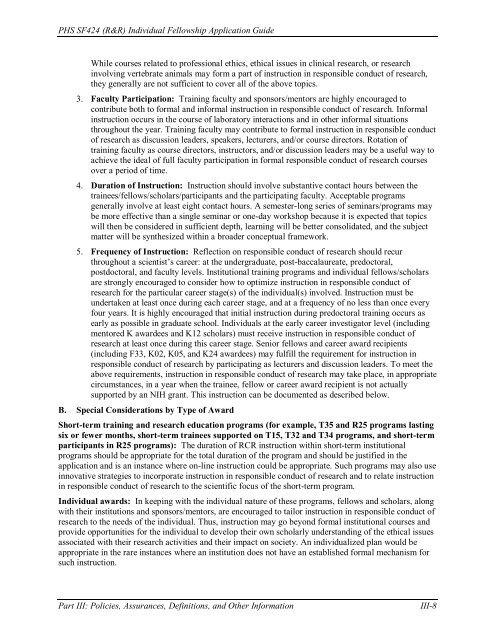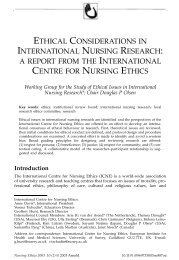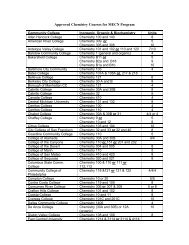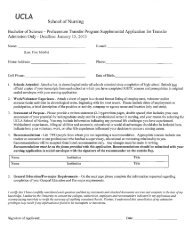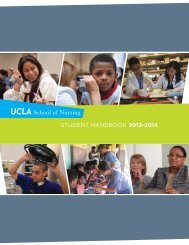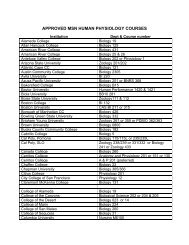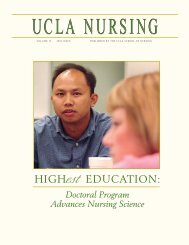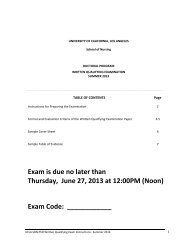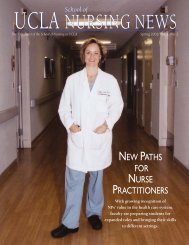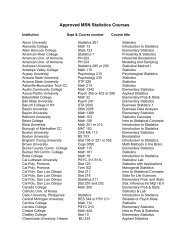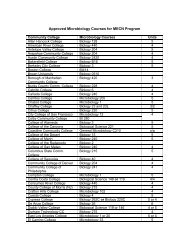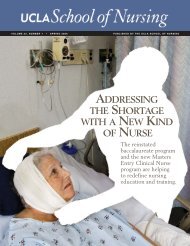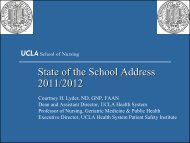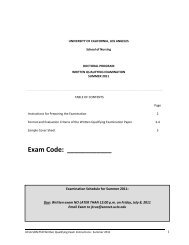Individual Fellowship Application Guide - UCLA School of Nursing
Individual Fellowship Application Guide - UCLA School of Nursing
Individual Fellowship Application Guide - UCLA School of Nursing
You also want an ePaper? Increase the reach of your titles
YUMPU automatically turns print PDFs into web optimized ePapers that Google loves.
PHS SF424 (R&R) <strong>Individual</strong> <strong>Fellowship</strong> <strong>Application</strong> <strong>Guide</strong>While courses related to pr<strong>of</strong>essional ethics, ethical issues in clinical research, or researchinvolving vertebrate animals may form a part <strong>of</strong> instruction in responsible conduct <strong>of</strong> research,they generally are not sufficient to cover all <strong>of</strong> the above topics.3. Faculty Participation: Training faculty and sponsors/mentors are highly encouraged tocontribute both to formal and informal instruction in responsible conduct <strong>of</strong> research. Informalinstruction occurs in the course <strong>of</strong> laboratory interactions and in other informal situationsthroughout the year. Training faculty may contribute to formal instruction in responsible conduct<strong>of</strong> research as discussion leaders, speakers, lecturers, and/or course directors. Rotation <strong>of</strong>training faculty as course directors, instructors, and/or discussion leaders may be a useful way toachieve the ideal <strong>of</strong> full faculty participation in formal responsible conduct <strong>of</strong> research coursesover a period <strong>of</strong> time.4. Duration <strong>of</strong> Instruction: Instruction should involve substantive contact hours between thetrainees/fellows/scholars/participants and the participating faculty. Acceptable programsgenerally involve at least eight contact hours. A semester-long series <strong>of</strong> seminars/programs maybe more effective than a single seminar or one-day workshop because it is expected that topicswill then be considered in sufficient depth, learning will be better consolidated, and the subjectmatter will be synthesized within a broader conceptual framework.5. Frequency <strong>of</strong> Instruction: Reflection on responsible conduct <strong>of</strong> research should recurthroughout a scientist’s career: at the undergraduate, post-baccalaureate, predoctoral,postdoctoral, and faculty levels. Institutional training programs and individual fellows/scholarsare strongly encouraged to consider how to optimize instruction in responsible conduct <strong>of</strong>research for the particular career stage(s) <strong>of</strong> the individual(s) involved. Instruction must beundertaken at least once during each career stage, and at a frequency <strong>of</strong> no less than once everyfour years. It is highly encouraged that initial instruction during predoctoral training occurs asearly as possible in graduate school. <strong>Individual</strong>s at the early career investigator level (includingmentored K awardees and K12 scholars) must receive instruction in responsible conduct <strong>of</strong>research at least once during this career stage. Senior fellows and career award recipients(including F33, K02, K05, and K24 awardees) may fulfill the requirement for instruction inresponsible conduct <strong>of</strong> research by participating as lecturers and discussion leaders. To meet theabove requirements, instruction in responsible conduct <strong>of</strong> research may take place, in appropriatecircumstances, in a year when the trainee, fellow or career award recipient is not actuallysupported by an NIH grant. This instruction can be documented as described below.B. Special Considerations by Type <strong>of</strong> AwardShort-term training and research education programs (for example, T35 and R25 programs lastingsix or fewer months, short-term trainees supported on T15, T32 and T34 programs, and short-termparticipants in R25 programs): The duration <strong>of</strong> RCR instruction within short-term institutionalprograms should be appropriate for the total duration <strong>of</strong> the program and should be justified in theapplication and is an instance where on-line instruction could be appropriate. Such programs may also useinnovative strategies to incorporate instruction in responsible conduct <strong>of</strong> research and to relate instructionin responsible conduct <strong>of</strong> research to the scientific focus <strong>of</strong> the short-term program.<strong>Individual</strong> awards: In keeping with the individual nature <strong>of</strong> these programs, fellows and scholars, alongwith their institutions and sponsors/mentors, are encouraged to tailor instruction in responsible conduct <strong>of</strong>research to the needs <strong>of</strong> the individual. Thus, instruction may go beyond formal institutional courses andprovide opportunities for the individual to develop their own scholarly understanding <strong>of</strong> the ethical issuesassociated with their research activities and their impact on society. An individualized plan would beappropriate in the rare instances where an institution does not have an established formal mechanism forsuch instruction.Part III: Policies, Assurances, Definitions, and Other InformationIII-8


